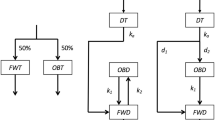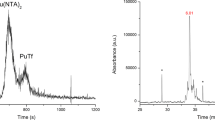Abstract
PROTEIN tagged with radioactive iodine (iodine-131) is proving useful in immunological research because of its ready detectability1. Also the firm substitution of the iodine in the tyrosine molecule renders conclusions based on the occurrence of radioactivity in the tissues more acceptable as evidence of the presence of the antigen or its partial breakdown products than has been the case with arsenic and dye tracers2. The application of various methods including paper chromatography to the study of the fate of iodinated antigens has produced results which appear of general interest.
This is a preview of subscription content, access via your institution
Access options
Subscribe to this journal
Receive 51 print issues and online access
$199.00 per year
only $3.90 per issue
Buy this article
- Purchase on Springer Link
- Instant access to full article PDF
Prices may be subject to local taxes which are calculated during checkout
Similar content being viewed by others
References
Wormall, A., Brit. Med. Bull., 5, 333 (1948).
Eisen, H. N., and Keston, A. S., J. Immunol., 63, 71 (1949).
Knox, W. C., and Endicott, F. C., J. Immunol., 65, 523 (1950).
Crampton, C. F., and Haurowitz, F., Science, 112, 300 (1950).
Leblond and Suë, P., Amer. J. Physiol., 134, 549 (1941).
Author information
Authors and Affiliations
Rights and permissions
About this article
Cite this article
LAWS, J. Fate of Radioactive Protein in the Animal Body. Nature 167, 820–821 (1951). https://doi.org/10.1038/167820b0
Issue Date:
DOI: https://doi.org/10.1038/167820b0
Comments
By submitting a comment you agree to abide by our Terms and Community Guidelines. If you find something abusive or that does not comply with our terms or guidelines please flag it as inappropriate.



